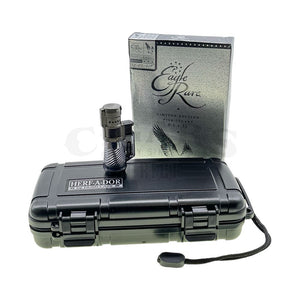How to Become a Cigar Connoisseur
Share
A connoisseur is defined as “an expert in an area of the fine or domestic arts, or somebody with discriminating taste in such a specialty.” It’s definitely something to aspire to if you’re serious about cigars. But exactly how do you become a cigar connoisseur?
There’s really no one certain path to connoisseurship, but there are some time-tested approaches. First, study up. It might seem odd to actually study a pastime or a leisure pursuit, but expertise and discriminating taste calls for nothing short of it. Fortunately, thanks to the continuing strong interest in cigar smoking, there are plenty of resources, both in print and online, to aid your education. Tobacconists, too, can be a great source of information, both when you’re just learning about cigars and when you’ve gone beyond beginning and delved deeper. Typically, the shops that really specialize in cigars are the places you’ll gain the most knowledge from, but don’t discount other places either—you never know where the next golden nugget of knowledge might come from.
What should you study? Everything. There’s a rich and fascinating history behind cigars and the pleasures of smoking them. Get to know it, as well as the plant itself, where it grows, how it’s grown and harvested, and what happens afterwards. Learn how they’re manufactured—this knowledge alone can tell you a lot if a cigar you’re smoking isn’t burning the way it should or if the big veins in a particular wrapper are something to worry about. Read up on the families—there are fascinating histories there as well, not just about the industry but about world history and politics as well. Ever wondered why there are so many cigar manufacturers based in southern Florida? Studying the history of cigars will give you the answer.
Secondly, experiment and experience. You can’t be a true connoisseur without a lot of smoking going on. Try different sizes and different lengths. Try different wrapper styles and fillers from different countries. Definitely try offerings from a variety of manufacturers. And, don’t forget price points. Connoisseurship speaks to expertise and discriminating taste, not snobbery. Even the most discriminating connoisseur knows that good values can be had at small prices.
Keep track of your experiments and experiences. Many cigar smokers enjoy keeping a smoking journal for recording their smoking journey. Things to keep track of include the manufacturer and name of cigar, its ring size and length, where purchased, wrapper style, and country of manufacture. Also good information is how much you paid, how long you kept it until you smoked it, and what you thought of it when you smoked it—what it looked like, how it felt, how it lit and burned, the time of day you smoked it, how it tasted, how much you smoked of it, what you might have eaten or drank along with it, and so on. Save the band and paste it in with your notes, and you’ll have a comprehensive record of your smoking experiences that you can refer back to time and time again.
Finally, share your expertise and your experience. Knowledge is nothing if not passed along to others. Find a cigar board or two on the Internet, lurk for awhile to see if it’s a place you’d like to spend some time at, and join in when the time is right. If your local tobacconist has a spot for cigar smokers to hang out, do so, at least once in a while. You’ll find that there’s a real brotherhood (sisterhood?) of cigar smokers in this world, and the camaraderie that exists within it can be a real joy to experience, and to be a part of.














